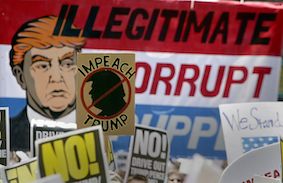
Since his inauguration in January 2017, Donald Trump has been subject to endless suspicion and scrutiny. Even the slightest bit of reason to believe that the current president has tampered with the legislative process of the country is a valid enough predication to investigate the case with full expenditure of available resources. Telling Michael Cohen to lie, obstructing the Mueller investigation, and calling for the Justice Department to investigate and prosecute his political opponents are all egregious acts that merit Donald Trump’s impeachment. However, the intricacies of the Constitution suggest that there are specific criteria that must be met in order for the president to be impeached — what the constitutional semantics suggest vastly differs from the common perception that impeachment is reasonable and imminent.
Under the exact wording of the Constitution, “The President, Vice President and all Civil Officers of the United States, shall be removed from Office on Impeachment for, and Conviction of, Treason, Bribery, or other high Crimes and Misdemeanors”. Whilst it does seem to explicitly enumerate the conditions under which impeachment can proceed, the expressions do not shed much light on the specific cases that are allowed to be associated with any one of those terms. The idea of “high” crimes as well as “misdemeanors” can arguably be attributed to all conducts of Donald Trump, and yet incoming House Judiciary Chair asserts how the offenses may not “rise to the level of importance where [Trump] could be impeached”. It may be that the Constitution is in itself flawed — especially when the status quo direly demands a “living constitution” that adapts through time and legitimately guides current events.
However, Alan Dershowitz, an American lawyer and the author of the bestseller Case Against Impeaching Trump, strictly believes that the pursuit of impeaching Trump would bring dangers that far exceed those already done by the president. Unfortunately, a constitution containing ambiguous terms does not imply that it can be subjected to one’s interpretation; the whims of the Congress cannot overrule the actual words of the Constitution. As of now, the investigation has not yet yielded solid enough evidence that reflects the conditions enlisted by the Constitution. For us, we have to note with caution that violating the Constitution to force a desirable outcome brings peril to the future validity of executive power, and the only remedy to the Trump presidency is to seek ways to amend the Constitution — not nullify it. This is the kind of case where desperate times do not call for desperate measures.
Upholding a value that dictates the quality of governance is tougher (and much more important) than taking down a fraudulent leader. In times of crisis, the three branches of the government should self-examine to see if their decisions consolidate that value. The biggest problem with the Trump impeachment case has been the appointment of a special counsel to investigate the crimes. The biases of some FBI agents, with James Comey’s ill-advised public statements, have only dug out improprieties that fail to rise to the level of importance of impeachment and have had an aggregate effect of damaging the solemnity of the Congress’ authority. From the very beginning, the Congress should have sought a group of non-partisan experts that can investigate the entirety of the 2016 election campaign. Arranging such a committee as soon as possible should be the primary goal of the Congress if it is to restore the neutrality of the investigation.
The search for the Constitution-adherent evidence has been stalled and somewhat compromised with series of meaningless hearings — acting Attorney General Matthew Whittaker’s imbecile remarks in the House Judiciary Committee, for example. Frustrated advocates of the Trump impeachment are making partisan endorsements to expedite the investigation, too. Hedge fund manager Tom Steyer has already donated millions of dollars to Democrats in the hopes they would work harder to impeach Trump. The government has to act quickly before such patterns grow, making the ruling of civil justice appear like a bickering between two parties.

